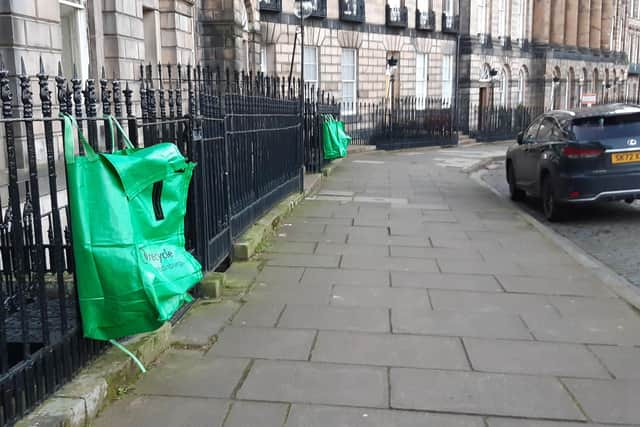Edinburgh council rules out underground bins but plans to continue with green gull-proof sacks in New Town
and live on Freeview channel 276
A study has recommended Edinburgh adopt an underground system for waste collection in the city’s World Heritage Site.
But council officials have already ruled it out, saying it would be too costly and difficult to install. Instead, councillors are being recommended to approve the continued use of gull-proof sacks in parts of the New Town rather than insisting on creating communal bin hubs in some of the Capital’s most historic streets.
Advertisement
Hide AdAdvertisement
Hide AdThe study by the independent Association of Public Service Excellence (APSE) looked at a variety of waste collection options for the World Heritage Site and said the best solution would be a pneumatic system similar to one used in the Norwegian city of Bergen, which has 7,500 metres of underground pneumatic pipes, sucking waste to a central depot and capable of transporting 50 tons of rubbish a day.


The APSE report says: “These systems are effectively like the high-powered waste chutes found in high-rise buildings, enabling waste to travel in horizontal pipes beneath the ground. They have waste deposit chutes like fully underground containers, similar to post boxes placed at regular intervals along the pavement or road, development court yards etc.” But it said the cost of Bergen’s scheme, covering 30,000 homes, was estimated at £100 million, extensive excavation would be required and it could take at least a decade to complete.
The council concluded: “Officers do not consider this to be deliverable in the short or medium term from a finance and infrastructure perspective and it is therefore discounted.”
APSE also suggested other underground options, involving either large underground bins with above-ground pillars for people to put the rubbish in or standard bins hidden underground and brought to the surface by hydraulic platforms. But the council rejected these too. “Again, officers do not believe this to be deliverable in the short or medium term due to financial or infrastructure considerations.”
Advertisement
Hide AdAdvertisement
Hide AdNow the council plans to continue with the trial of green gull-proof sacks to collect recycling in certain streets in the New Town, where black gull-proof sacks have been in use for residual waste for some years. Residents in 1,000 properties were issued with the green canvas bags to replace their red boxes for the collection of dry mixed recycling, increasing the capacity available for recycling. The pilot has been running since October 2022 and the local groups have been proactive in promoting and monitoring the impact of the trial.
“Residents have embraced the trial, and the feedback has been very positive. Operations have also seen an improvement in littering as there is less likelihood of the waste being blown out of the gull proof sacks. However, the tonnage hasn’t demonstrated a significant increase in the amount of recycling collected, despite increasing capacity from 44 to 85 litres and the trial has not shown a reduction in the non-recyclable waste collected.”
Not only will the gull-proof sack scheme continue for at least another six months, but it will be expanded to cover another 2,000 homes in the area.
Transport and environment convener Scott Arthur said: “In the World Heritage Site, in the New Town, there was some concern from residents around the impact the communal bins were going to have on the World Heritage status, so a decision was made to relax the approach and work with the community on alternatives.
Advertisement
Hide AdAdvertisement
Hide Ad"The gull-proof sacks are working, both from our perspective and the residents feel that as well, so we’re going to continue with that and probably double the number of households which get access to that service because it is working.”